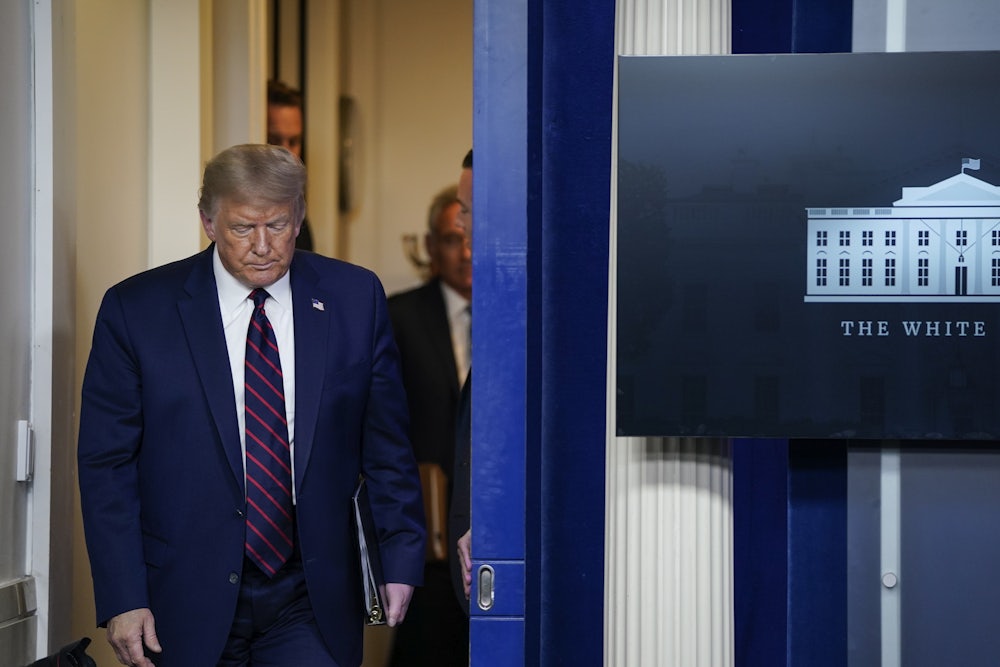The president was in denial, and now his sunny assessment of the situation is disproven.
No, I’m not talking about the news that President Donald Trump and the first lady tested positive for Covid-19 not long after Trump mocked Joe Biden for excessive mask-wearing and insisted that America was “rounding the final turn in the pandemic.” Though he got that wrong, too. I wish the first couple a speedy recovery.
Rather, I’m talking about Trump’s claim, in those same September 7 remarks in which he spouted that nonsense about rounding the final turn on Covid-19, that “we’re currently witnessing the fastest labor market recovery from an economic crisis in history—world history.”
Setting aside Trump’s made-up “greatest in history” claim, which by now we’re all well conditioned to interpret as bullshit, labor market recovery was relatively fast last month. But nobody expected that would continue—and it hasn’t. This morning, the Labor Department reported that the economy added 661,000 jobs in September—less than half as many as it added in each of the previous four months.
The unemployment rate went down a little, to 7.9 percent, but only because there was a steep decline in labor-force participation. That metric for women, in particular, dropped to its lowest level since 1987, because schools can’t reopen and women still provide most childcare in this country.
This was entirely foreseen. The president’s own son has been remote-schooling since the start of the school year. In a fortunate bit of news, Barron has tested negative for the virus, but his exposure to his mother (and possibly his father; it’s unclear how often the two see one another) means he won’t be permitted to return to his high school this month, as planned, because he’ll have to quarantine.
Beyond this bit of predictable upheaval on the jobs front, the larger problem is the administration’s strong preference for magical thinking over close attention to economic fundamentals. Trump’s delusional belief that the labor market would instantly recover from a pandemic that his administration handled with greater incompetence and corruption than anyone would have thought possible is one of the chief reasons that he’s expected to lose his reelection bid. He may well receive the news from a hospital bed.
If so, Trump won’t be the only one suffering. His fanciful depiction of an overnight jobs recovery has also caused incalculable suffering to working people and to the economy as a whole.
Trump’s administration still refuses to restore the $600 weekly add-on to unemployment benefits that expired at the end of July. On an annualized basis, according to Josh Bivens of the left-leaning Economic Policy Institute, the benefit’s expiration “pulled $667 billion of purchasing power out of the U.S. economy” just during the month of August.
House Speaker Nancy Pelosi came under some criticism this week for refusing to accept Treasury Secretary Steve Mnuchin’s $1.6 trillion stimulus proffer, which included a $400 weekly add-on, instead of $600, and $250 billion in aid to state and local governments, instead of the $436 billion sought by the Democrats.
Was Pelosi playing politics? Of course she was, and as of Friday afternoon, it appeared to be working, with Mnuchin reportedly boosting to $400 billion proposed aid to state and local governments and Pelosi saying she now expects the two sides to come to terms.
The Trump administration is at long last starting to recognize the high price it’s paying for the president’s denial. Oh, that unending and very dangerous pandemic! Oh, that persistent high unemployment! As a result, it may perhaps finally be willing to pay something close to full sticker price for a relief package undoing its feckless damage to the economy.
I’d be sorry to see the deal fall apart. But if it does, I’ll still find it hard to fault Pelosi for playing politics. Maximizing Democratic representation in Congress and the White House is another important means to address this terrible economic pain. And at this late hour, it’s a perfectly honorable one.
